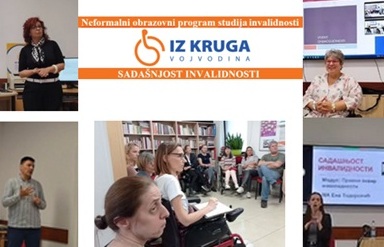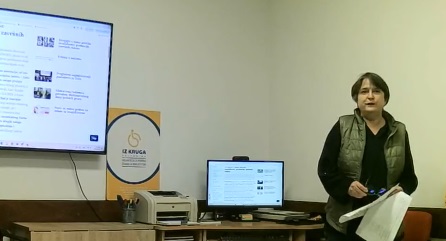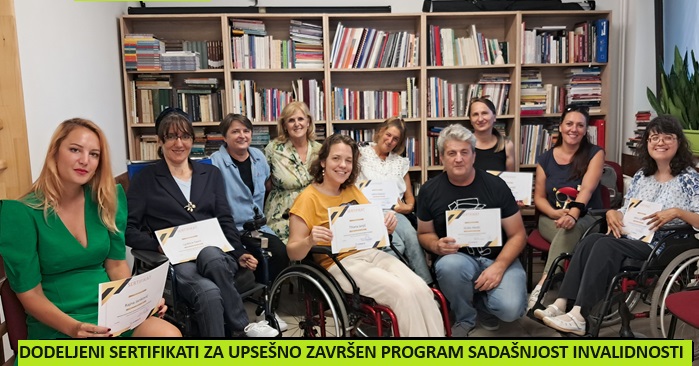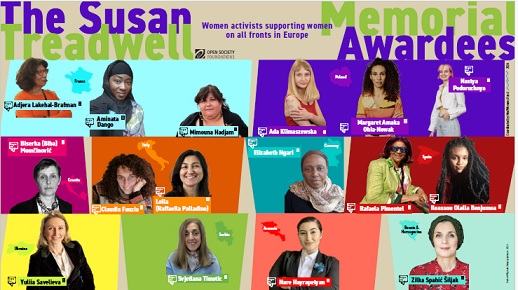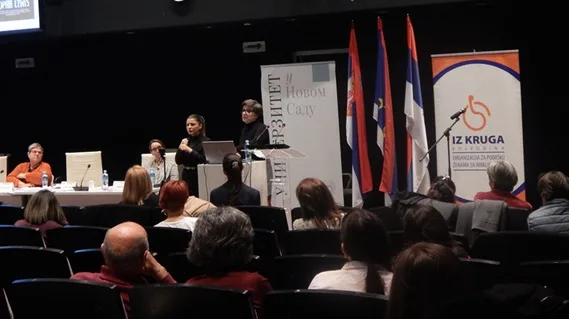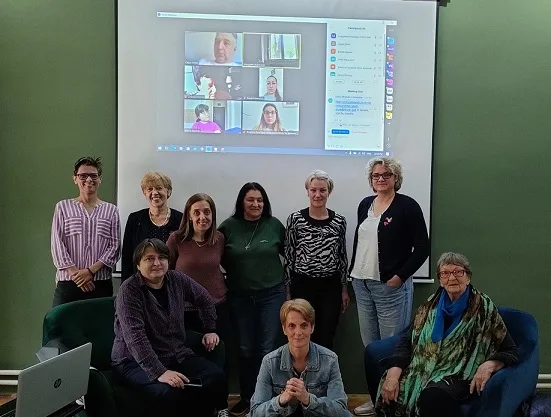Students who successfully completed The Non-Formal Educational Program Disability Today, presented publicly their papers. Read here a summaries of some of them.
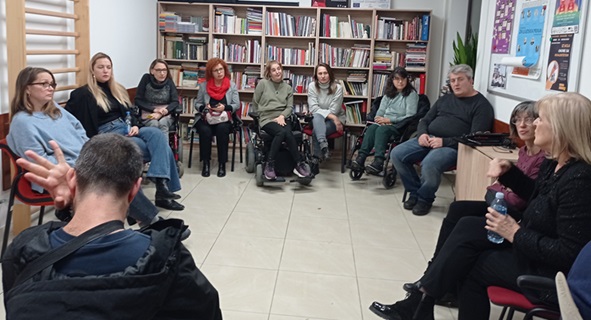
Dragana Markovic’s final paper was Personal Assistance: from a Woman at the Market to the Head of the City Administration for Children and Social Welfare—Why We All Need to Know What It Is and Why Self-Representative Organizations Need to Provide It. The paper is based on personal experience with using and organizing assistance and on a short online questionnaire conducted from June 5 to June 15, 2024. about how much the public knows what PA is. The work is significant because, in simple language, it brings the concept of independent living and personal assistance services closer to the general public (people who have no contact with this topic, those who have incomplete knowledge, but also service users and personal assistants, and even decision-makers in the field of social protection). It distinguishes between other social protection services and personal assistance as the most necessary and expedient service. Indirectly it also enhances the conditions under which this service should be provided and used.
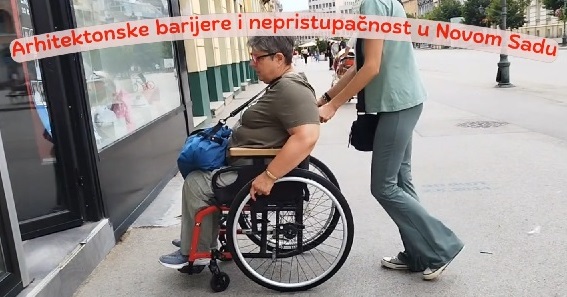
Tatjana Stojsic Petkovic, Mirjana Jaksic, and Olga Vrtunski made a short documentary film, Architectural Barriers and Inaccessibility in Novi Sad, as their final work. The work included filming a woman, a wheelchair user, accompanied by a personal assistant during a tour of shops located in the streets of Zmaj Jovina, Kralja Aleksandra and Dunavska. Entry to most of the shops was impossible, either because of one, two or three stairs at the entrance, the threshold was too high or the door was too difficult to open. In a conversation with saleswomen and salesmen who work in those stores, we learned that the majority of them have no idea what they could do to make the entrance possible for people using wheelchairs, some were completely confused by the entry of a person using a wheelchair, while certain number said that they plan to build ramps. They were unanimous in that they are not responsible but the owners of the premises or shops and they all said that they did not want their statements to be found on social networks or somewhere where they would be visible nor were they interested in contributing with a newspaper article that they might write. The work is significant because it openly talks about architectural barriers via a short form so that everyone can see and think about how much they care about people with disabilities when it comes to architectural barriers.
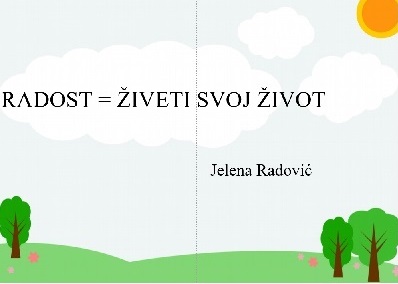
Jelena Radovic made her final work as a presentation named Happiness = Living Your Life. The work is inspired by the philosophy of independent living of persons with disabilities, negative personal experiences, and the possibilities new technologies create concerning communication. It talks about the basic principles of the philosophy of independent living, that is, how to manage one’s own life when the right to make a decision (business capacity) is lost due to the still prevailing medical approach towards disabled people. The situation of going to a psychologist to assess the suitability of using an electric wheelchair is described in detail. The psychologist did not even make an effort to understand the client, despite her wish to communicate by herself, did not want to listen to her, behaved as if she was not in the room, addressed her father, and ignored her entirely. The report said – she is not suitable for communication, hence, it was impossible to perform the test. This work aims to highlight that the world of disability activism is full of people who speak loudly and clearly. The ways of communication can be different, but it is pivotal to hear the voices of people who have difficulty speaking!
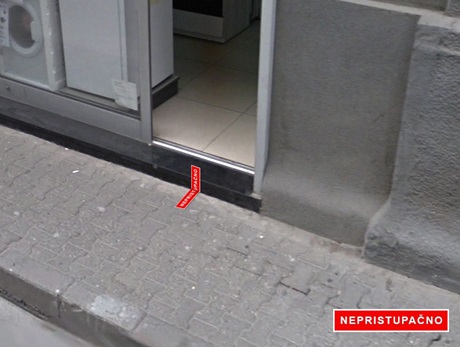
Rajna Jankovic’s final paper is From Action to Raising Awareness. In it, she maps numerous inaccessible objects. She labels them with pre-manufactured stickers saying ‘inaccessible‘. The action will continue and then be recorded with a photo and a video. The work is significant because it draws attention to the problem of inaccessibility, which results, among other things, in the isolation and lower visibility of persons with disabilities in public life.
A final paper, The Motif of Disability in the Stories of Milica Jankovic, was written by Jelena Zagorac. The work included an analysis of short stories published in the book One Possible Autobiography edited by Slavica Garonja and published by Prometey Publishing House. The work is significant because it gives us insight into the roots of discrimination against people with disabilities that we still face today. Prometey Publishing House published on its website a modified version of Jelen Zagorac’s final paper.
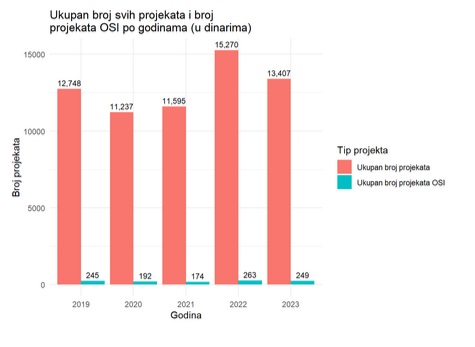
Dusko Medic prepared the final paper Analysis of projects intended for the promotion of persons with disabilities in public competitions organized in Serbia in the period 2019-2023. The work included the analysis of projects aimed at improving the position of persons with disabilities from the data from the database on public tenders, developed in cooperation with BIRN Serbia, Civic Initiatives and local teams of civil society organizations. The work is significant because it provides insight into the allocation of budget funds for the improvement of the position of persons with disabilities in Serbia, indicating the level of financial support and the priorities of public tenders. Also, it enables deducing about trends in financing and the connection with the total budgets, which can serve as an improvement basis for support policies for persons with disabilities. At the same time, it contributes to the transparency of the spending of public funds and the strengthening of arguments for better inclusion of people with disabilities in society.
The promotion of the final works of female and male students was realized with the general support of the Reconstruction Women’s Fund and co-financing by the City Administration for Social and Child Protection of the City of Novi Sad through support for the programs of citizens’ associations in the field of social protection that are of interest to the City of Novi Sad for the year 2024.
Translated by Suzana Belos
